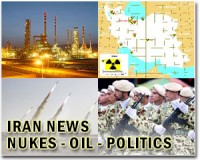| . |  |
. |
Tehran (UPI) Jun 29, 2009 Iran's Islamic Revolutionary Guard Corps, the praetorian guard of the Tehran regime, has gained immense power with the re-election of Mahmoud Ahmadinejad as president and is likely to gain more in the months ahead by crushing his political opponents. The Guard Corps, or Pasdaran as it is known in Farsi, has established a parallel authority in the Islamic Republic over the last few years, giving it wide-ranging political and economic power to a degree that surpasses that held by the military in other authoritarian states in the region. By keeping Ahmadinejad, one of their own, in the presidency, the Pasdaran will ensure that the immense military, political and economic power it has amassed in recent years also remains intact -- and a constant threat to Iran's neighbors. The 125,000-strong Guard Corps was formed by Ayatollah Ruhollah Khomeini in 1979 as an ideologically pure force to protect the infant Islamic regime following the overthrow of Shah Mohammad Reza Pahlavi. It soon became the regime's muscle and was largely responsible for repelling Saddam Hussein's army when it invaded in September 1980. Over the eight years of war that ensued, the Pasdaran became known for its suicidal determination and was hailed as the savior of the republic. Ahmadinejad, a revolutionary hard-liner, was a Pasdaran field commander during that war, often operating behind enemy lines. When he was first elected in 2005, he appointed senior officers of the corps to key positions in the government, in particular the Interior and Intelligence ministries, whose pervasive networks dominate life in Iran. Dozens won election to Parliament with the support of Ahmadinejad's government and the financial and political support of the corps. Before Ahmadinejad's 2005 victory, the Pasdaran had been steadily taking control of whole sectors of the economy. After 2005, it became an economic powerhouse that was handed huge government contracts in construction, engineering, transportation and the all-important energy sector. The corps' critics say it also runs illegal ports through which pass an estimated one-third of Iran's total imports -- without any state scrutiny. According to various accounts, the Pasdaran now controls at least one-third of the economy. Critics say that as much as $46 billion has vanished over the years, with much of it being used to fund proxies such as Hezbollah in Lebanon and Hamas in the Gaza Strip. The corps' treasury is used to finance its military programs. These include Iran's controversial nuclear program and ballistic missile forces, both of which it controls. In 2008 the Guard Corps was given the mission of protecting Iran's coastal regions on the Gulf against U.S. or Israeli attack. That put serious decision-making authority and military firepower in the hands of the Pasdaran should current tensions with the United States or Israel spill over into conflict. But, possibly more worrying than that is the fact that the Pasdaran's wealth is used to finance its clandestine operations outside the country, in Iraq, the Gulf and the Levant. Since 2006 Hezbollah and Hamas have both blunted Israeli military offensives aimed at eliminating them. The corps' elite Al-Quds Force, which conducts clandestine operations outside Iran, has become extremely active. In the event of conflict it would be the regime's strike arm against U.S. and Israeli interests on a global scale. "The striking influence that the Guard Corps gained beyond Iran's borders in the four years of President Ahmadinejad's presidency, especially in Iraq, is arguably one of the main factors that established the position of Iran as a decisive player in the region, threatening the authority of the United States," says Canadian-Iranian analyst Shahir Shahidsaless, who has written extensively on Iran and the Middle East. All this gives the Pasdaran a big stake in maintaining Ahmadinejad as president, by subduing and crushing the current upheaval in Iran over his disputed June 12 re-election, and ensuring that the fundamentalist regime headed by Supreme Leader Ayatollah Ali Khamenei remains in place. "It is widely believed that only an exclusive group of individuals, including Khamenei, have been in the loop of dealings with the Guards' finances," Shahidsaless observed. "This would make it very costly for the corps if an outsider came to power "No one knows better than the exclusive group which deals with the secret projects of the corps how costly and risky it would be to let a team of strangers taker over the administration." Share This Article With Planet Earth
Related Links Learn about nuclear weapons doctrine and defense at SpaceWar.com Learn about missile defense at SpaceWar.com All about missiles at SpaceWar.com Learn about the Superpowers of the 21st Century at SpaceWar.com
 Iran's tensions with West aim to stall nuclear talks: analysts
Iran's tensions with West aim to stall nuclear talks: analystsLondon (AFP) June 29, 2009 Heightened tensions between Iran and the West after the Islamic republic's disputed presidential poll allow Tehran to deflect demands to re-start talks on its nuclear programme, analysts said Monday. But experts agree that Iran has no intention of sliding into international isolation like North Korea over its nuclear ambitions. Iranian authorities arrested nine local staff at the British ... read more |
|
| The content herein, unless otherwise known to be public domain, are Copyright 1995-2009 - SpaceDaily. AFP and UPI Wire Stories are copyright Agence France-Presse and United Press International. ESA Portal Reports are copyright European Space Agency. All NASA sourced material is public domain. Additional copyrights may apply in whole or part to other bona fide parties. Advertising does not imply endorsement,agreement or approval of any opinions, statements or information provided by SpaceDaily on any Web page published or hosted by SpaceDaily. Privacy Statement |